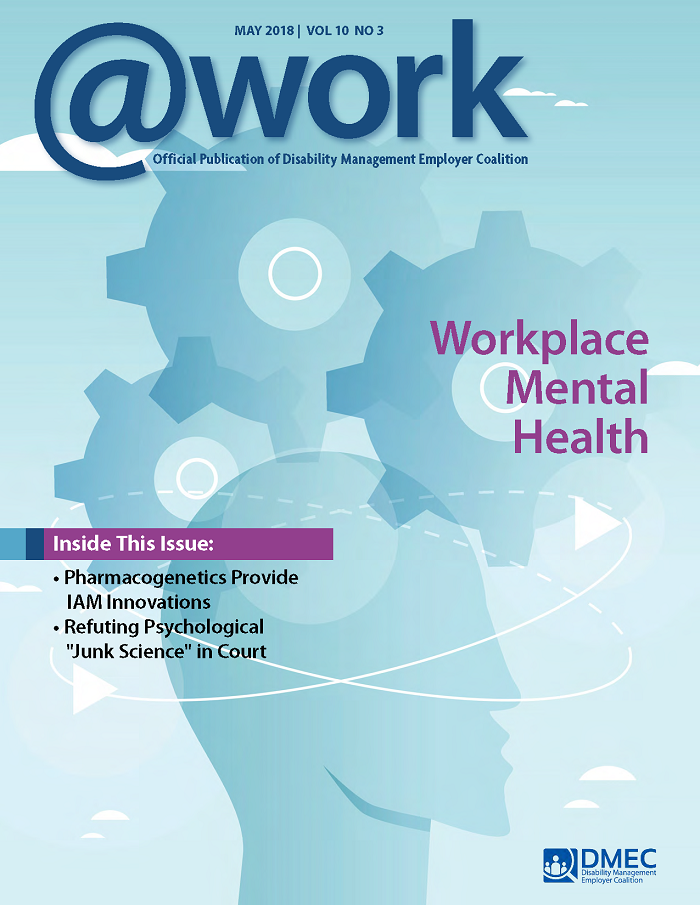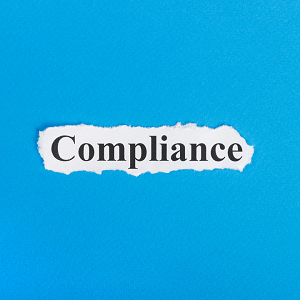
May 2018
Workplace Mental Health
Employee mental health is one of the most significant challenges faced by employers today. The immense costs of mental health are due to the high prevalence of mental health conditions as well as insufficient or ineffective treatment. This issue of @Work magazine features a variety of program models and approaches to address mental health conditions in the workplace.
Features
Science and Innovation in Workplace Disability Management Programs
Emerging innovations in medicine and psychology are driving the evolution of disability management. Two of the most recent and inspiring innovations that are showing real results and practical application in return to work, are pharmacogenetics and cognitive behavioral therapy. Read more.

An Effective Tool in Court: Refuting Psychological “Junk Science”
The federal and state workers' compensation systems contain a great deal of imprecision that makes psychological claims difficult and unpredictable. Employers can eliminate some of these challenges by applying current psychological standards of care for treatment and when claims are litigated. Read more.

Spotlight Articles
Program Showcase: Sleep for Mental Health
Approximately two-thirds of individuals with anxiety and/or depression also suffer from insomnia. Clinical research is showing that treating insomnia actually reduces the symptoms of anxiety and depression, meaning sleep improvement is a strategic target for improving mental health. Read more.

RTW Programs: Integrating Accommodation
While our culture has made great strides in recent years to become more accepting of people with behavioral health conditions, these individuals often face a huge challenge: rejoining or remaining in the workforce. One of the biggest issues for these individuals is how employers approach or support an employee experiencing a mental illness. Read more.

RTW Case Study: Recovery from PTSD Episode
Employers are significantly affected when mental health issues strike an employee, whether that impact is felt first through a health plan or a disability case. While the medical system focuses on diagnosis and treatment, employers often focus on symptoms and how to reduce their impact on the employee’s functional abilities. Read more.

Columns
Work/Life Squeeze: ADA Association Provision
The Americans with Disabilities Act (ADA) provides job protections for employees associated with an individual with a disability — a little-known ADA provision with great potential to cause problems for employers. Read more.

Integrated Absence Management: Workplace Mental Health
Although treatment for mental illnesses may improve mood, behavior, productivity, and absenteeism, and can be cost-effective for employers, studies have shown that many people with mental health illnesses don’t get proper treatment. Why does this problem persist? Several factors may be involved. Read more.

Absence Matters: PTSD in the Workplace
Although identified especially among veterans, post-traumatic stress disorder (PTSD) is now a diagnosis in virtually all population groups. As more attention has turned toward the importance and value of holistic health, PTSD is becoming the focus of more workplace conversations. Read more.

The Disabled Workforce: Psychological Disabilities and the ADA
Work is stressful, but how do you know if mental illness is at the root of your employee’s stressful feelings, and what you can do about it? Do your employees need a reasonable accommodation or simply support to learn coping mechanisms to manage their life and work stressors? Read more.

Innovations Enhance Outcomes: Employee Assistance Programs
Today, it’s not only substance abuse and psychological conditions impacting employee productivity, it’s also child care, elder care, and finances. Recognizing that many issues impacting employee productivity are simply life problems, many EAPs now provide services to address these issues. Read more.

Accommodations Best Practice Guide: Stay-at-Work Strategies
Mental health conditions in the workplace present challenges for both employers and employees. When employees’ mental health impacts job performance, one challenge is having that first discussion regarding possible accommodations. Read more.

Riding the Demographic Wave: The Middle Child Generation
While a lot of attention is paid to Baby Boomers and Millennials, Generation X may be the most important generation currently in the workplace. As more Gen Xers step into important leadership roles, having a focused employee engagement strategy for Gen X is paramount. Read more.

6 Pillars of Leave Management: Mental Illness Risk
Mental illness can be difficult for employers to identify. Although laws prevent employers from gathering sensitive health information from employees, data from your leave management efforts can help you appropriately target interventions. Read more.

Aligning Workers' Compensation: Mental Health and the EAP
Attitudes are changing about engaging with mental health issues that impact workers’ compensation claims. Three new medical codes for psychiatric healthcare, introduced in 2018, are making the change possible. Read more.

Departments
The CEO's Desk: Let's Stamp Out Stigma
The national conversation about healthcare reform has touched on many important topics; however, in the last several years, our attention has turned to mental health in a more critical way. Healthcare professionals, policymakers, and employers are taking overdue steps to address this pervasive and debilitating illness. Read more.

DMEC News: May 2018
In this issue of DMEC News, we highlight two new resources DMEC is making available to its members: the 2017 employer leave management survey raw data set and regional compliance webinars. Read more.

Compliance Memos: May 2018
The May 2018 compliance memos cover ongoing discussion of leave as an ADA accommodation, compliance questions about the Massachusetts Equal Pay Act, and impacts of the New York Paid Sick Leave Law. Read more.




